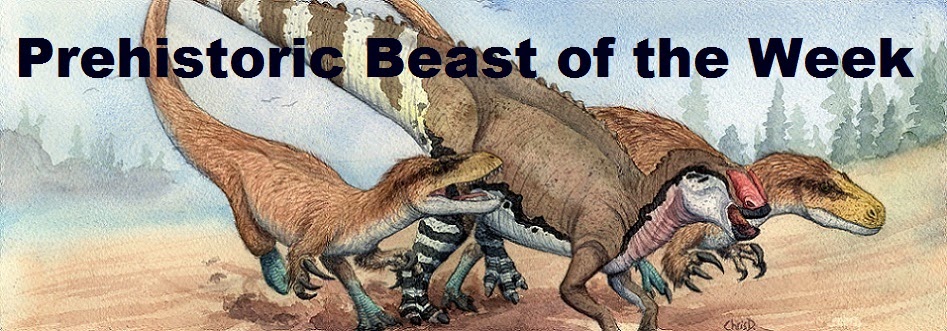 Plateosaurus (sp.)
Plateosaurus (sp.)Plateosaurus, name meaning “broad lizard” is a prosauropod dinosaur that is related to other dinosaurs such as Barosaurus. Plateosaurus was from the Triassic period between 214 and 204 million years ago. Only two species are recognized for Plateosaurus, P engelhardti and P. gracilis. P. gracilis is from slightly older rocks. Plateosaurus was discovered in 1834 by Johann Friedrich Engelhardt and described, three years later, by Hermann von Meyer. Plateosaurus has the distinct honor of being the fifth dinosaur named after Richard Owen coined them term. It was unfortunately, due to scrappy remains, not considered to be within the group when it was first named. Plateosaurus is now actually one of the best known dinosaurs to science thanks to the fact that over a hundred skeletons have been found. Most of these finds have helped paint the picture for this animal.
A bipedal herbivore, Plateosaurus had a small skull with a long mobile neck. It had teeth designed for crushing plants, powerful hind limbs, short and muscular arms, and hands that were good for grasping. The hands had large claws on three fingers. Plateosaurus could walk either as bipedal (on two legs) or quadrupedal (on all four's). It would have spend most of the time as a biped. Fully grown individuals ranged in sizes between 4.8 and 10 meters (16 and 33ft long) and weighed between 600 and 4,000 kilograms (1,300 and 8,800 lbs). Expected lifespan was between 12 to 20 years, but the maximum life span is still relatively unknown.
References
Dixon, Dougal. The World Encyclopedia of Dinosaurs & Prehistoric Creatures. London: Lorenz Books/Anness Publishing. 2010. Print.
Palmer, Dr. Douglas, et. al. Prehistoric Life. New York: DK Publishing. 2009. Print.
Paul, Gregory S. Princeton Field Guide to Dinosaurs. New Jersey: Princeton University Press. 2010. Print.
 |
| Plateosaurus life restoration by Christopher DiPiazza |
A bipedal herbivore, Plateosaurus had a small skull with a long mobile neck. It had teeth designed for crushing plants, powerful hind limbs, short and muscular arms, and hands that were good for grasping. The hands had large claws on three fingers. Plateosaurus could walk either as bipedal (on two legs) or quadrupedal (on all four's). It would have spend most of the time as a biped. Fully grown individuals ranged in sizes between 4.8 and 10 meters (16 and 33ft long) and weighed between 600 and 4,000 kilograms (1,300 and 8,800 lbs). Expected lifespan was between 12 to 20 years, but the maximum life span is still relatively unknown.
References
Dixon, Dougal. The World Encyclopedia of Dinosaurs & Prehistoric Creatures. London: Lorenz Books/Anness Publishing. 2010. Print.
Palmer, Dr. Douglas, et. al. Prehistoric Life. New York: DK Publishing. 2009. Print.
Paul, Gregory S. Princeton Field Guide to Dinosaurs. New Jersey: Princeton University Press. 2010. Print.

No comments:
Post a Comment